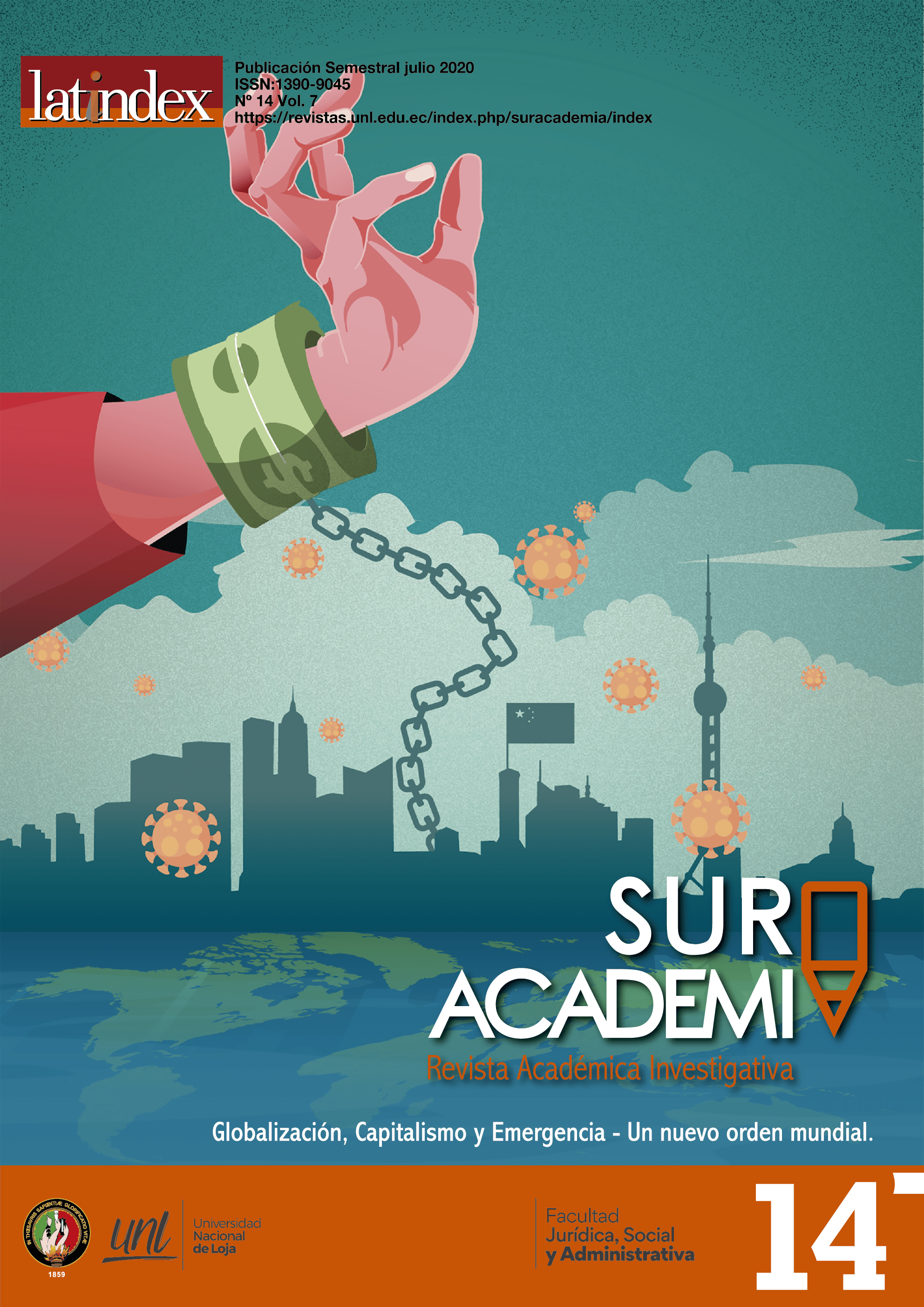El apoyo populista bajo la perspectiva de la racionalidad limitada.
Main Article Content
Abstract
Article Details

This work is licensed under a Creative Commons Attribution-NonCommercial-NoDerivatives 4.0 International License.
Sur Academia proporciona acceso inmediato y gratuito a todos los contenidos de esta edición electrónica. La publicación no tiene ningún coste para los autores.
References
Bakker, B., Rooduijn, M. & Gijs Schumacher. (2015) The psychological roots of populist voting: Evidence from the United States, the Netherlands and Germany. European Journal of Political Research. Volume 55, Issue 2. First Published: 18 October 2015. DOI: https://doi.org/10.1111/1475-6765.12121
Bang, H. (2017). Why are younger voters less likely to back populist politics? The London School of Economics and Political Science. Recuperado de https://blogs.lse.ac.uk/europpblog/2017/08/15/why-are-younger-voters-less- likely-to-back-populist-politics/
Ben-Zeév, A. (2010). Are Negative Emotions More Important than Positive Emotions? Psychology Today. Recuperado de https://www.psychologytoday.com/us/blog/in-the-name-love/201007/are- negative-emotions-more-important-positive-emotions
Brazil Institute, (2018). Voter Demographics in Brazil. Wilson Center. Recuperado de https://www.wilsoncenter.org/article/voter-demographics-brazil
Campanella, E. (2018). The link Between Aging and Populism. Demographics. Retirement Income Journal. Recuperado de https://retirementincomejournal.com/article/the-link-between-aging-and- populism/
Campello, D. & Zucco C. (2013). Merit or Luck? International Determinants of Presidential Performance in Latin America. Princeton University and Rutgers University. Version 3.0 April 19, 2013
Caramani, D. & Manucci, L. (2019). National past and populism: the re-elaboration of fascism and its impact on right-wing populism in Western Europe. Department of Political Science, University of Zurich, Zurich, Switzerland. Routledge. West European Politics, 2019, VOL. 42, NO. 6, 1159- 1187 (2019) DOI: https://doi.org/10.1080/01402382.2019.1596690
Carstensen & Hartel, R. (2006). When I ́m 64. National Research Council (US) Committee on Aging Frontiers in Social Psychology, Personality, and Adult Development Psychology. Washington (DC): National Academies Press (US). Recuperado de https://www.ncbi.nlm.nih.gov/books/NBK83771/
Cisneros, A. (2018). The populist vote in the Andean region: the cases of Colombia, Ecuador and Peru. Universidad de Cuenca (Ecuador). Revista CIDOB d ́Afers Internacionals n.119, p. 209-242 DOI: https://doi.org/10.24241/rcai.2018.119.2.209
Engesser, Sven, Nayla Fawzi and Anders Olof Larsson (2017) 'Populist online communication: introduction to the special issue', Information, Communication & Society, 20(9): 1279-1292. DOI: https://doi.org/10.1080/1369118X.2017.1328525
Gould & Harrington, R. (2016). 7 charts show who propelled Trump to victory. Business insider. Recuperado de https://www.businessinsider.com/exit-polls-who-voted- for-trump-clinton-2016-11#more-young-people-voted-for-clinton-but-that-bloc- did-not-include-as-many-voters-as-those-over-40-who-as-a-majority-voted-for- trump-2
Guiso, L., Herrera, H., Morelli, M., Sonno, T. (2018). Populism: Demand and Supply. Recuperado de https://www.heliosherrera.com/populism.pdf
Hanoch, Y., Wood, S. & Thomas Rice. (2007). Bounded Rationality, Emotions and Older Adult Decision Making: Not So Fast Yet So Frugal. Human Development. School of Psychology, Plymouth, UK; Scripps Collage, Claremont, Calif, and UCLA School of Public Health, University of Plymouth, Los Angeles, Calif, USA. DOI: https://doi.org/10.1159/000109835
Herbert A. Simon. (2010). A Behavioral Model of Rational Choice. The Quarterly Journal of Economics. Vol.69, No. 1 (Feb, 1955), pp.99-118. Published by: The MIT Press DOI: https://doi.org/10.2307/1884852
Herbert A. Simon. (1991) Bounded Rationality and Organizational Learning. Department of Psychology. Carnegie Mellon University, Pittsburgh, Pennsylvania 15213. Organization Science. Vol.2 No. 1 February 1991. USA pp. 125-134
Hoffman, M. (2019). Turkish Conservatives Loyalty to Erdogan and Views on Potential Successors. Foreign Policy and security. Center for American Progress. Recuperado de https://www.americanprogress.org/issues/security/news/2019/12/05/478087/turk ish-conservatives-loyalty-erdogan-views-potential-successors/
Jones, B. (2003). Bounded Rationality and Political Science: Lessons from Public Administration and Public Policy. Journal of Public Administration Research and Theory. Oct 2003; 13,4; ABI/INFORM Global pg.395. University of Washington. DOI: https://doi.org/10.1093/jopart/mug028
Kahneman, D. (2003). A Perspective on Judgment and Choice. Mapping Bounded Rationality. Princeton University. American Psychological Association. Vol. 58, No. 9, 697-720. September 2003 DOI: https://doi.org/10.1037/0003-066X.58.9.697
Kulesza, Piotrowska & Rae, G. (2018). Left Wing Non-Voters in Poland, Report. Recuperado de https://www.transform- network.net/fileadmin/user_upload/study_naprzod_non- voters_report_final_en.pdf
Kuklinski, J & Paul J. (1998). Reconsidering the Rational Public: Cognition, Heuristics , and Mass Opinion. University of Illinois at Urbana-Champaign. Department of Political Science and Institute of Government and Public Affairs. December 31, 1998.
Los Tiempos, (2019). “Millenials”, el punto fuerte de Carlos Mesa. Elige, Elecciones generales. Los Tiempos. Recuperado de https://www.lostiempos.com/actualidad/pais/20190804/millenials-punto-fuerte- carlos-mesa
Marco, J. (2016). El voto por edades: Jóvenes y populismo. Actualidad. La razón. Recuperado de https://www.larazon.es/elecciones-generales/el-voto-por-edades- jovenes-y-populismo-LP12950812/
Matthijs, R. (2017). What unites the voter bases of populist parties? Comparing the electorates of 15 populist parties. European Political Science Review. Volume 10, Issue 3 August 2018, pp. 351-368. Recuperado de https://www.cambridge.org/core/journals/european-political-science-review/article/what-unites-the-voter-bases-of-populist-parties-comparing-the-electorates-of-15-populist-parties/2C93B9C18341B38768DF216604FDBBA2
Moncagatta, P. & Safranoff, A. (2013). Who supports the Latin American “populist” left? Revista Mexicana de Análisis Político y Administración Pública. Departamento de Gestión Pública y Departamento de Estudios Políticos y de Gobierno. Volumen II, número 1, enero-junio 2013, Pp. 29-48
Mude, C. (2004). The Populist Zeitgeist', Government & Opposition, 39(4): 541–563. DOI: https://doi.org/10.1111/j.1477-7053.2004.00135.x
Palmer, P. (2019). The Terrifying Rise of Authoritarian Populism. Cato Institute. Recuperado de https://www.cato.org/publications/commentary/terrifying-rise- authoritarian-populism
Public issue, (2015). Greek elections 9/2015 – “NDs” voter demographics. Public Issue. Recuperado de https://www.publicissue.gr/en/2899/nd-voter-demos-9-2015/
Rico, G., Guinjoan, M. & Eva Anduiza. (2017) The Emotional Underpinnings of Populism: How Anger and Fear Affect Populist Attitudes. Universitat Autonoma de Barcelona. Swiss Political Science Review. Doi:10.1111/spsr.12261 DOI: https://doi.org/10.1111/spsr.12261
Roodujin, M., (2017). What unites the voter bases of populist parties? Comparing the electorates of 15 populist parties. European Political Science Review. Recuperado de https://www.researchgate.net/publication/317694363_What_unites_the_voter_b ases_of_populist_parties_Comparing_the_electorates_of_15_populist_parties DOI: https://doi.org/10.1017/S1755773917000145
Roodujin, M., Burgoon, B. J van Elsas, E. G van de Werhorst, H. (2017). Radial distinction: Support for radical left and radical right parties in Europe. European Union Politics. SAGE Journals. Recuperado de https://journals.sagepub.com/doi/pdf/10.1177/1465116517718091 DOI: https://doi.org/10.1177/1465116517718091
Schmidt, A. (2018). Challenges of the illiberal democracy in Hungary. Some aspects to the 2018 elections. Polish Political Science Review. University of Pecs, Faculty of Humanities. Recuperado de https://www.researchgate.net/publication/333996829_Challenges_of_the_Illiber al_Democracy_in_Hungary_Some_Aspects_to_the_2018_Elections
Sexual Policy Watch, (2018). Brazilian 2018 presidencial elections in figures. Around the world. Recuperado de https://sxpolitics.org/brazilian-2018-presidential- elections-in-figures/19183
Stanford Encyclopedia of Philosophy, (2018). Bounded Rationality. Recuperado de https://plato.stanford.edu/entries/bounded-rationality/
Van Beek, U. (2019). Democracy under threat. A Crisis of Legitimacy? Palgrave macmillan. Transformation Research Unit. Department of Political Science. Stellenbosch University. South Africa. Recuperado de https://books.google.com.ec/books?id=EkBbDwAAQBAJ&pg=PA99&lpg=PA9 9&dq=poland+votation+per+age+group&source=bl&ots=qMPc4meRQM&sig= ACfU3U0GQWtJYlNDAo_G6Th5036dnydSLg&hl=de&sa=X&ved=2ahUKEw jYj6SyopfoAhXpYd8KHY7vAl4Q6AEwFXoECAsQAQ#v=onepage&q&f=fals

